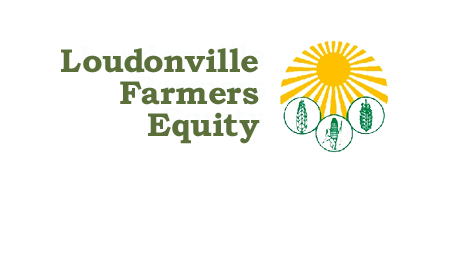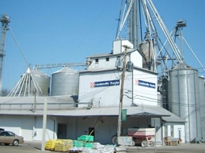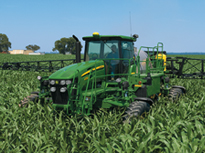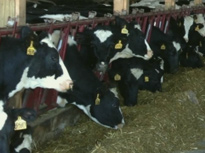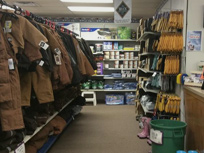News
Loudonville Equity supports local communities 4-H Clubs and FFA Chapters.
Each year The Loudonville Farmer Equity attends surrounding county and street fairs with the hope of promoting agricultural excellence in our communities youth. The Equity attends seven different fairs supporting the livestock auctions and sponsors awards and events! Join us in our cause to help Feed the World and maximize the productivity level on your farm!
Patronage: A Co-op Point of Difference
Co-ops may look and act like any other business; after all, they provide products, services and expertise. But that’s where the similarities end, and two big differences stand out:
• Co-op difference #1: A cooperative is owned and controlled by those who use it, not by investors or private individuals.
• Co-op difference #2: A cooperative distributes benefits to its member-owners on the basis of use. That’s called patronage.
Patronage is based on earnings from the products and services members buy from their co-op. The more successful the co-op’s year, the greater the potential for patronage, which is returned to members in the form of cash and equity. By law, co-ops must pay out a minimum of 20 percent of their earnings in cash, equity or a combination of both. Patronage distribution is determined by the cooperative’s board of directors, whether it’s a local co-op or a regional cooperative such as CHS.
A cooperative can use retained earnings (the part not paid out annually to members) to invest in its business, whether it is building a new feed mill or financing an acquisition.
It’s the board’s job to create a patronage distribution balance that benefits current, past and future members:
• Current: Pay cash to members, which they can use to support their own businesses.
• Past: Revolve (pay out) equity to retired members.
• Future: Retain some earnings to invest in the business for the long term.
Joe Zumwalt served on the board of Ursa (Ill.) Farmers Cooperative for 10 years. He says a co-op’s vision and direction influences how patronage is returned. For example, when Ursa needed to build a new river terminal and improve other facilities, part of the board’s goal was to retain working cash to finance those projects. “Patronage isn’t just dollars and cents,” he says. “It’s also about growth and providing value to members long term.”
From a producer standpoint, patronage is wonderful, says Neal Keppy, farmer and board member of River Valley Cooperative, Davenport, Iowa. “The co-op uses profits generated from the business I do with them to survive and thrive, which benefits current and future member-owners. It’s the board’s responsibility to be good stewards of that equity. Eventually, our equity investment in the co-op is returned to us.
“If you do business with a non-co-op, you may get cheaper prices up front, but the money you spend there will never come back to you.”
• Co-op difference #1: A cooperative is owned and controlled by those who use it, not by investors or private individuals.
• Co-op difference #2: A cooperative distributes benefits to its member-owners on the basis of use. That’s called patronage.
Patronage is based on earnings from the products and services members buy from their co-op. The more successful the co-op’s year, the greater the potential for patronage, which is returned to members in the form of cash and equity. By law, co-ops must pay out a minimum of 20 percent of their earnings in cash, equity or a combination of both. Patronage distribution is determined by the cooperative’s board of directors, whether it’s a local co-op or a regional cooperative such as CHS.
A cooperative can use retained earnings (the part not paid out annually to members) to invest in its business, whether it is building a new feed mill or financing an acquisition.
It’s the board’s job to create a patronage distribution balance that benefits current, past and future members:
• Current: Pay cash to members, which they can use to support their own businesses.
• Past: Revolve (pay out) equity to retired members.
• Future: Retain some earnings to invest in the business for the long term.
Joe Zumwalt served on the board of Ursa (Ill.) Farmers Cooperative for 10 years. He says a co-op’s vision and direction influences how patronage is returned. For example, when Ursa needed to build a new river terminal and improve other facilities, part of the board’s goal was to retain working cash to finance those projects. “Patronage isn’t just dollars and cents,” he says. “It’s also about growth and providing value to members long term.”
From a producer standpoint, patronage is wonderful, says Neal Keppy, farmer and board member of River Valley Cooperative, Davenport, Iowa. “The co-op uses profits generated from the business I do with them to survive and thrive, which benefits current and future member-owners. It’s the board’s responsibility to be good stewards of that equity. Eventually, our equity investment in the co-op is returned to us.
“If you do business with a non-co-op, you may get cheaper prices up front, but the money you spend there will never come back to you.”
Visit Us
Monday-Friday:
8:00 AM- 5:00 PM
Saturday:
8:00 AM - NOON
Sunday:
Closed
514 West Main Street,
Loudonville, Ohio 44842
